Millbridge is a small neighbourhood of Plymouth, on the boundary of what used to be the towns of Plymouth and Devonport, in the English county of Devon.

Plymouth is a port city and unitary authority in Devon, South West England. It is located on the south coast of Devon, approximately 36 miles (58 km) southwest of Exeter and 193 miles (311 km) southwest of London. It is bordered by Cornwall to the west and southwest.

Plymouth Sound, or locally just The Sound, is a deep inlet or sound in the English Channel near Plymouth in England.

Ford Park Cemetery is a 34.5-acre (140,000 m2) cemetery in central Plymouth, England, established by the Plymouth, Stonehouse & Devonport Cemetery Company in 1846 and opened in 1848. At the time it was outside the boundary of the Three Towns and was created to alleviate the overcrowding in the churchyards of the local parish churches. Its official name at the time of inception was The Plymouth, Devonport and Stonehouse Cemetery, although it is now seldom referred to by that title.
Stonehouse Creek, in Plymouth (England), is also known as Stonehouse Lake. The Creek was dominated by two military buildings, the Royal Naval Hospital and the Stoke Military Hospital, which faced each other.
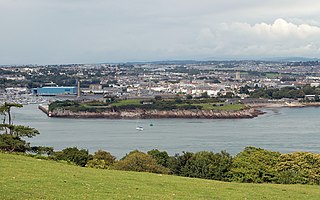
East Stonehouse was one of three towns that were amalgamated into modern-day Plymouth. West Stonehouse was a village that is within the current Mount Edgcumbe Country Park in Cornwall. It was destroyed by the French in 1350. The terminology used in this article refers to the settlement of East Stonehouse which is on the Devon side of the mouth of the Tamar estuary, and will be referred to as Stonehouse.

The Tamar is a river in south west England that forms most of the border between Devon and Cornwall. A part of the Tamar Valley is a World Heritage Site due to its historic mining activities.

Plymouth Citybus is a bus operator in Plymouth. It is a subsidiary of the Go South West sector of the Go-Ahead Group.
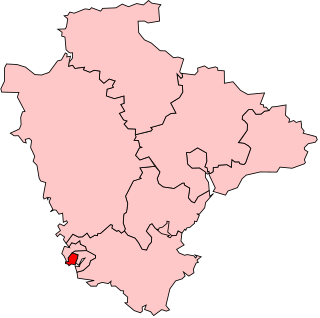
Plymouth Drake was a borough constituency in the city of Plymouth, in Devon. It elected one Member of Parliament to the House of Commons of the Parliament of the United Kingdom by the first past the post system of election.
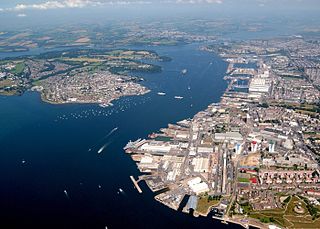
His Majesty's Naval Base, Devonport is one of three operating bases in the United Kingdom for the Royal Navy and is the sole nuclear repair and refuelling facility for the Royal Navy. The largest naval base in Western Europe, HMNB Devonport is located in Devonport, in the west of the city of Plymouth, England.

The Exeter to Plymouth railway of the London and South Western Railway (LSWR) was the westernmost part of a route competing with that of the Great Western Railway (GWR) and its 'associated companies' from London and Exeter to Plymouth in Devon, England. Whereas the GWR route from Exeter followed the coast to Newton Abbot and then went around the southern edge of Dartmoor, the LSWR route followed the northern and western margins of Dartmoor, passing through the towns of Crediton, Okehampton, and Tavistock.
The culture of Plymouth is a social aspect of the unitary authority and city of Plymouth that is located in the south-west of England. Built in 1815, Union Street was at the heart of Plymouth's historical culture. It became known as the servicemen's playground, as it was where sailors from the Royal Navy would seek entertainment. During the 1930s, there were 30 pubs and it attracted such performers as Charlie Chaplin to the New Palace Theatre. It is now the late-night hub of Plymouth's entertainment strip, but has a reputation for trouble at closing hours.

The History of Plymouth in Devon, England, extends back to the Bronze Age, when the first settlement began at Mount Batten a peninsula in Plymouth Sound facing onto the English Channel. It continued as both a fishing and continental tin trading port through the late Iron Age into the Early Medieval period, until the more prosperous Saxon settlement of Sutton, later renamed Plymouth, surpassed it. With its natural harbour and open access to the Atlantic, the town found wealth and a national strategic importance during the establishment of British naval dominance in the colonisation of the New World. In 1620 the Pilgrim Fathers departed from Plymouth to establish the second English colony in America. During the English Civil War the town was besieged between 1642 and 1646 by the Royalists, but after the Restoration a Dockyard was established in the nearby town of Devonport. Throughout the Industrial Revolution Plymouth grew as a major mercantile shipping industry, including imports and passengers from the US, whilst Devonport grew as a naval base and ship construction town, building battleships for the Royal Navy – which later led to its partial destruction during World War II in a series of air-raids known as the Plymouth Blitz. After the war was over, the city centre was completely rebuilt to a new plan.
Sport in Plymouth, Devon, England, dates back to the 19th century with its first club, Plymouth United F.C., being founded in 1886. It is the largest city in England never to have had a football team in the first tier of English football. It is home to Plymouth Argyle Football Club, who play in the Football League One at the Home Park stadium in Central Park. It is Plymouth's only professional football team, however the city used to have another team called Plymouth United F.C. dating back to 1886. The club takes its nickname from the group of English non-conformists that left Plymouth for the New World in 1620: the club crest features the Mayflower, which carried the Pilgrims to Massachusetts and the club's mascot is named Pilgrim Pete.
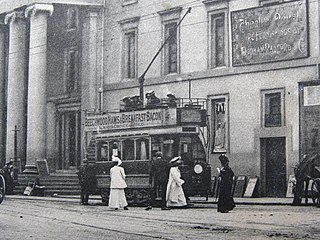
The tramways in Plymouth were originally constructed as four independent networks operated by three different companies to serve the adjacent towns of Plymouth, Stonehouse and Devonport in Devon, England. The merger of the 'Three Towns' into the new borough of Plymouth in 1914 was the catalyst for the three companies to join up under the auspices of the new Plymouth Corporation. The network was closed in 1945, partly as a result of bomb damage during World War II.
The following is a timeline of the history of the city of Plymouth, Devon, England.

The fortifications of Plymouth in Devon are extensive due to its natural harbour, its commanding position on the Western Approaches and its role as the United Kingdom's largest naval base. The first medieval defences were built to defend Sutton Harbour on the eastern side of Plymouth Sound at the mouth of the River Plym, but by the 18th century, naval activity had begun to shift westward to Devonport at the mouth of the River Tamar. During the Victorian era, advances in military technology led to a huge programme of fortification encompassing the whole of Plymouth Sound together with the overland approaches. Many of these works remained in military use well into the 20th century.
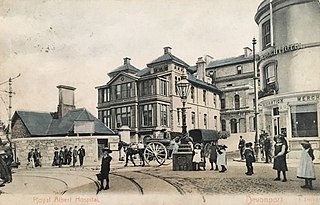
Plymouth General Hospital was an acute general hospital in Plymouth, Devon.